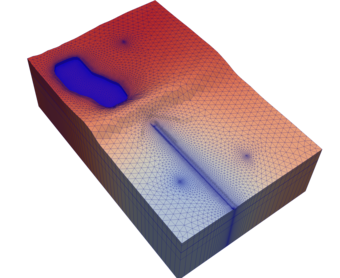 |
MODFLOW 6
version 6.7.0.dev1
USGS Modular Hydrologic Model
|
 |
MODFLOW 6
version 6.7.0.dev1
USGS Modular Hydrologic Model
|
Data Types | |
| type | rowtype |
| type | sparsematrix |
Functions/Subroutines | |
| subroutine | destroy (this) |
| subroutine | initialize (this, nrow, ncol, rowmaxnnz) |
| subroutine | initializefixed (this, nrow, ncol, maxnnz) |
| subroutine | filliaja (this, ia, ja, ierror, sort) |
| subroutine | addconnection (this, i, j, inodup, iaddop) |
| subroutine | insert (j, thisrow, inodup, iadded) |
| subroutine | sort (this, with_csr) |
| subroutine | sortintarray (nval, iarray) |
| subroutine | csr_diagsum (ia, flowja) |
| subroutine sparsemodule::addconnection | ( | class(sparsematrix), intent(inout) | this, |
| integer(i4b), intent(in) | i, | ||
| integer(i4b), intent(in) | j, | ||
| integer(i4b), intent(in) | inodup, | ||
| integer(i4b), intent(inout), optional | iaddop | ||
| ) |
| subroutine sparsemodule::csr_diagsum | ( | integer(i4b), dimension(:), contiguous | ia, |
| real(dp), dimension(:), contiguous | flowja | ||
| ) |
| subroutine sparsemodule::destroy | ( | class(sparsematrix), intent(inout) | this | ) |
Definition at line 34 of file Sparse.f90.
| subroutine sparsemodule::filliaja | ( | class(sparsematrix), intent(inout) | this, |
| integer(i4b), dimension(:), intent(inout) | ia, | ||
| integer(i4b), dimension(:), intent(inout) | ja, | ||
| integer(i4b), intent(inout) | ierror, | ||
| logical, intent(in), optional | sort | ||
| ) |
Definition at line 87 of file Sparse.f90.
| subroutine sparsemodule::initialize | ( | class(sparsematrix), intent(inout) | this, |
| integer(i4b), intent(in) | nrow, | ||
| integer(i4b), intent(in) | ncol, | ||
| integer(i4b), dimension(nrow), intent(in) | rowmaxnnz | ||
| ) |
| subroutine sparsemodule::initializefixed | ( | class(sparsematrix), intent(inout) | this, |
| integer(i4b), intent(in) | nrow, | ||
| integer(i4b), intent(in) | ncol, | ||
| integer(i4b), intent(in) | maxnnz | ||
| ) |
| subroutine sparsemodule::insert | ( | integer(i4b), intent(in) | j, |
| type(rowtype), intent(inout) | thisrow, | ||
| integer(i4b), intent(in) | inodup, | ||
| integer(i4b), intent(inout) | iadded | ||
| ) |
| subroutine sparsemodule::sort | ( | class(sparsematrix), intent(inout) | this, |
| logical(lgp), optional | with_csr | ||
| ) |
| subroutine sparsemodule::sortintarray | ( | integer(i4b), intent(in) | nval, |
| integer(i4b), dimension(nval), intent(inout) | iarray | ||
| ) |